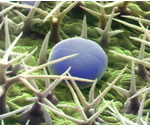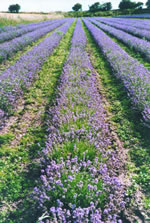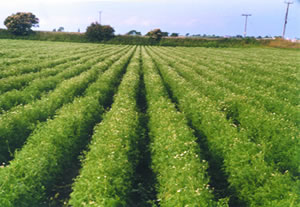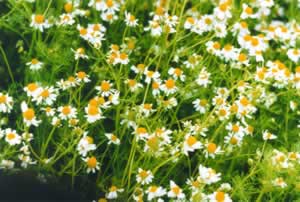Positive Health Online
Your Country

Organic Production of Essential Oils in the UK
listed in aromatherapy, originally published in issue 49 - February 2000
Agriculture, our most important global industry, provides the world's population (currently three billion) with food from plants and animals. Farmers grow plants and animals to harvest as foodstuffs and are limited, mostly, by the local weather, pests (eg, rabbits, pigeons, rats, slugs, snails, animal parasites, soil nematodes, insects, bacteria, fungi and viruses), weeds, plant and animal diseases. This means that in the UK, in our cultivated fields, pastures and orchards (assuming that we can control pests and diseases), we can only grow plants (as crops) which can withstand low temperatures and frost.
However, despite the limitations of the climate, UK farmers have achieved outstanding success in providing us with healthy, nutritious, available and cheap food (meat, dairy products, eggs, cereals, oil-seeds, potatoes, vegetables, fruit). In fact, in many ways, farmers are victims of their own success and have produced too much too quickly for a consumer turning increasingly towards different food (curry, pasta, rice) and away from animal products. On top of this a very sinister disease emerged in our national dairy herds, appropriately called "mad-cow", which has terrified the European community.

Figure 1 Secretory glands on the surface of the lavender plant. Also shows non-secretory glands
Courtesy of: Microscopix, Middle Travelly, Beguildy, Knighton, Powys, Wales Tel: 01547 510242.

Figure 2 Electron micrograph of the peppermint oil gland on the leaf. The arrows indicate that the gland is filling with oil.
Other glands are visible which do not contain an oil.

Figure 3 A field of lavender cultivated on Merseyside after two years.
The problems of over-production, food mountains, infected livestock, anxious consumers and bankrupt farmers have led to a real national disaster which has to be resolved because in forty years time, the world population will have tripled to over nine billion people, all needing food, energy and materials.[1]
It must also concern us all that our very valuable agricultural land is disappearing, silently and secretly. This land is lost forever because the top soil disappears. This layer has taken hundreds of years to evolve into a mixture of sand, silt, clay, organic matter, animals and microbes which provides the essential and critical fertile environment for the plants to grow. On Merseyside, over a ten year period, two hundred hectares of very productive and naturally fertile arable land has disappeared each year.
Farmers need alternative, non-food, sustainable crops for their land and many industries (pharmaceutical, complementary health, flavour and fragrance) increasingly need to source high-quality plants and plant products. Coupled with this, the consumer (aromatherapist, medical herbalists, pharmacist) is aware that good quality, botanically authenticated, organically grown plants offer a superior product.
Research into temperate-climate essential oil plants (peppermint, lavender, Roman chamomile, German chamomile, sage, clary sage, angelica, helychrysum, dill, etc.) as crops began a number of years ago at Liverpool's John Moores University.[2] The results indicated the potential of these plants as alternative crops for the farmers,[3] as the plants produced essential oils of excellent quality[4] to supply the increasingly demanding market place. As a result, a unique partnership between academics, researchers, farmers and end-users (aromatherapists, medical herbalists) was initiated in 1995 to develop new commercial crops for the UK and to grow these crops using organic systems of husbandry, as 1 well as traditional methods.
Strictly speaking, the term "organic" relates to the unique characteristics of plants and animals, and their products, because of their carbon basis. The term also refers to a class of chemical compounds that are formed from carbon. Carbon, in the form of carbon dioxide, enters the plant via tiny microscopic holes, most often found in the leaf, the stomata. From there it enters the chloroplast and, when the energy of the sun contacts the chlorophyll, a tiny electrical current is initiated. Water and carbon dioxide molecules are broken down and rearranged to produce sugar (carbohydrate) and oxygen via a very complex process called photosynthesis. Many tonnes of carbon are taken from the atmosphere and "fixed" by plants in this way, and animals acquire the carbon by eating the plants. It is a very intricate process and vital to life.
The term "organic" is also used to describe a particular method of growing plants (and animals). Although the term has become familiar, and certainly very popular, most people only have a vague idea of its meaning and range. We do need to be precise about these terms though, and clear about our definition of desired product quality.
Organic farming is the outcome of thinking and practice since the early twentieth century and involves a variety of alternative methods of agricultural production. Although a full description of the history and principles of organic production is beyond the scope of this short article, the interested reader is directed to a comprehensive publication on the principles of organic farming[5] and towards a book which is compulsory reading for all those interested in the environment, and the effects of the indiscriminate use of chemicals by various industries.[6]
Organic farming can briefly be described as using methods of crop (and animal) husbandry which coexist with, rather than dominate, natural systems, sustain and build soil fertility, minimise pollution and damage to the environment and ensure the ethical treatment of animals. This serves to protect and enhance the farm environment with particular regard to conservation and wildlife by using sustainable crop rotations which avoid the use of fertilisers in the form of soluble mineral salts. The use of agro-chemical pesticides is prohibited. Animal husbandry techniques are used which meet the animal's physiological, behavioural and health needs. Organic farming pursues a number of aims such as the production of quality agricultural products which contain no chemical residues, do not pollute the soil and groundwater with pesticides and make full use of natural, local and renewable resources.
The consumer needs to be aware of a number of issues regarding organic, and so-called organic production. First of all, many farmers already follow the above criteria when growing their plants and animals. Failure to follow the above procedures does not mean that farmers are deliberately poisoning the consumer, the land and their animals. Many herbal products and essential oils have appeared in the marketplace labelled "organic" without detailing methods of production and can be misleading for the consumer. We need to be aware that legislative criteria exists in the UK for producing plants and their products organically and to be clear about what this means for farmers and growers.
Our decision to produce medicinal and aromatic plants organically meant that the farmers had to make certain changes to their existing systems of husbandry. First of all, we needed to scrutinise the plants themselves and see why they are ideal candidates for organic farming.
Medicinal and aromatic plants (many called herbs) synthesise and accumulate oils in discrete structures (known as glands, or trichomes) often distributed on the leaves and flowers (See Figures 1 and 2). Figure 2 shows a typical (secretory) gland on a peppermint leaf which contains an oil. Although we don't know why a plant should make these structures and fill them with oil, it seems obvious that, during evolution (bear in mind that plants were on the globe before animals), plants had to defend themselves from parasites and predators such as fungi and insects, and subsequently, grazing animals. These Figures also show that the plant also makes another structure which doesn't contain oil (non-secretory). Both glands look like weapons. The plant needs weapons as a defensive strategy as they are lodged in the soil by their roots and can't escape from danger.
We have examined the oils, identified their components and tested the oils against bacteria and fungi.[7] They are very biologically active and can, in fact, act as pesticides – bactericides, fungicides, insecticides and, in some cases, herbicides. But, is this surprising? Why should a plant invest all that genetic material (DNA, enzymes, photosynthate) into producing something which is useless? Plants need to survive and therefore need to be competitive. Studies on many plants reveal them to be ruthless in their determination to survive and leave their own offspring. Plants have more genetic material than most animals and can count time very efficiently as well as measure and react to, minute changes in day-length and temperature.
Many cultivated agricultural crops have had their defensive strategies bred out of them in favour of more valuable characteristics such as yield. Medicinal and aromatic plants, as crops, are really wild plants as they haven't been selected and bred for optimum cultivation in a particular environment. In practical terms, this means that they don't necessarily respond to fertilisers. In reality, many produce higher yields of oil due to environmental stresses. Since they have not been cultivated on a large scale in the UK, they have not prompted the upsurge of crop pests and diseases and this also may be due to the properties of the oil.
In 1996, major UK arable farmers began the cultivation of medicinal and aromatic plants on their farms on Merseyside. They undertook to cultivate unknown perennial plants (peppermint, Roman chamomile, lavender, sage) to produce an essential oil without knowing how to get the oil out of the plant. Added to this they agreed to use organic systems of husbandry. In the UK, in order to comply with legislative criteria regarding organic cultivation, farmers must comply with European Council Regulation (EEC) No 2092/91, which came into force on July 22nd 1991, and which lays down the main principles for organic production and the rules that must be followed for the processing and sale of organic products. The advantage of these legal instruments is to formalise recognition of the organic sector, to lay down common rules for operators who regard themselves as belonging to it, and to guarantee consumers with a means of unmistakably identifying genuine organic produce, thus effectively eliminating the abuses previously frequent in the sector.

Figure 4: German chamomile plants growing organically in Lancashire. The flower heads are forming and filling with oil seven weeks after sowing the seeds. The plants are grown in rows to allow the farmers to interrow cultivate rather than using a herbicide.

Figure 5 Close-up of German chamomile at harvest. The organically grown plants are full of oil in the flower head.
In reality, this has taken the farmers three years. During this time they have taken major areas of their land out of conventional husbandry, they have put this land into conversion prior to full-scale organic production and they have applied for status with the Soil Association. They are cultivating medicinal and aromatic plants in a completely chemical-free environment. Of course, this means that they are subject to inspection by the Soil Association and must sign a contract with them agreeing to carry out operations in accordance with their defined standards.
What has been achieved for the farmers and for the consumer and what does the future hold for the industries involved? During the last few years a dedicated team has been created to produce novel, high-quality, organically grown medicinal and aromatic plants for the production of essential oils in the UK. Fields of lavender (Figure 3), peppermint, Roman chamomile and German chamomile (Figures 5) have been sown and planted. As the crops have been growing in the Lancashire fields, designers and engineers have constructed on-farm hydro-distillation apparatus for the commercial extraction of the oils from the plants. Scientists have left their traditional university laboratories and relocated to the farms where the farmers have provided space in redundant buildings for elaborate equipment to measure and monitor their crops and the essential oils they produce (via Gas Chromatography). The farmers have produced some of the finest oils the market place has ever seen in a remarkably short space of time, using published systems of organic husbandry, and have therefore produced a unique UK product. Alongside the farmers, major end-users (including aromatherapists) have been appraising the oils including the use of organoleptic techniques (taste and smell), scrutinising the Gas chromatography / Mass spectroscopy data (provided by the on-farm laboratory) which analyses the component identification data, and visiting the fields of plants. The farmers are committed to growing these new, high-value crops and achieving maximum quality for the consumer, as well as providing an excellent value-for-money product. A whole new UK industry is being created and will bring with it numerous benefits for all those concerned.
References
1. Okkerse C and van Bekkum H. From fossil to green. Green Chemistry, pp 107-104. Paper 8/09539F. 1999.
2. Collins JE and Bishop CD. Evaluation of Monarda citriodora var. citriodora as an alternative Western European non-food oil crop. Second European Symposium on Industrial Crops and Products. Palazzo Dei Congressi, Pisa, Italy. 22-24 November. 1993. Conference Paper.
3. Collins JE, Bishop CD, Deans SG and Svoboda KP. Composition of the essential oil from the leaves and flowers of Monarda citriodora var. citriodora grown in the United Kingdom. Journal of Essential Oil Research. 6: 27-29. 1994
4. Collins JE, Lepp NW, Svoboda KP and Deans SG. Changes in the volatile oil from Monarda citriodroa var. citriodora due to ontogeny. Chromatography and Analysis. 34: 5-7. Aug/Sep 1994.
5. Blake F. Organic Farming and Growing. The Crowood Press Ltd, Ramsbury, Marlborough, Wiltshire, SN8 2HR. ISBN 1-85223-838-0. 1994.
6. Carson R. Silent Spring. Penguin Books. ISBN 0 14 01.3891 9. 1962.
7. Collins JE, Bishop CD, Deans SG and Svoboda KP. Antibacterial and antioxidative properties of the volatile oil of Monarda citriodora var. citriodora. Abstract. 23rd International Symposium on Essential Oils. Scottish Agricultural Colleges, Auchincruive, Ayr, Scotland. Sep 9-12. 1992.
Comments:
-
No Article Comments available